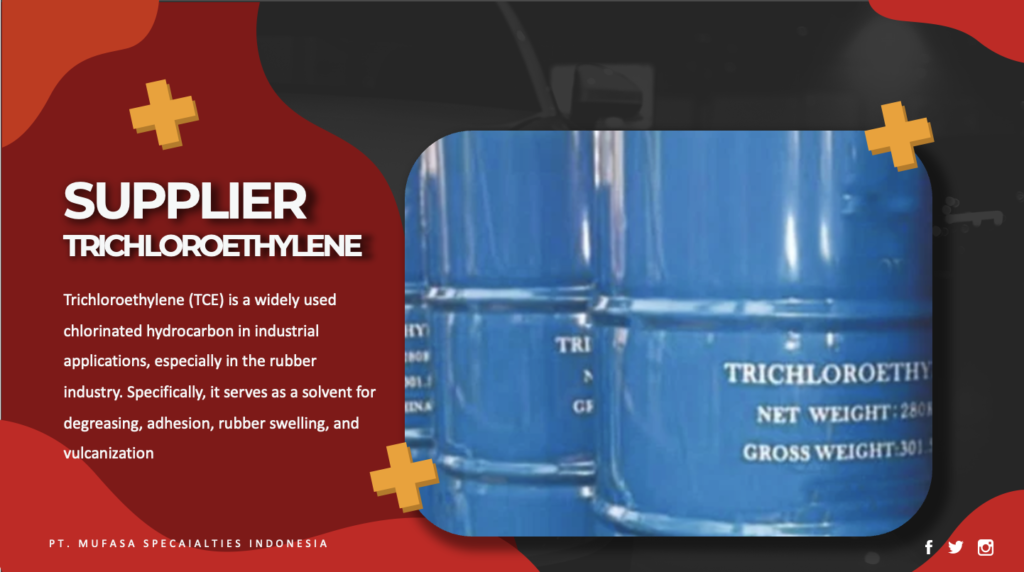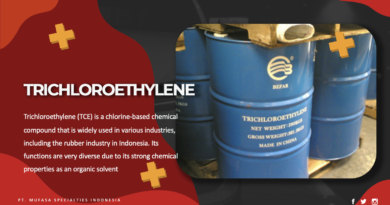
Supplier Trichloroethylene
Supplier Trichloroethylene (TCE) is a widely used chlorinated hydrocarbon in industrial applications, especially in the rubber industry. Specifically, it serves as a solvent for degreasing, adhesion, swelling, and vulcanization. Because of its high solvency power, non-flammability, and volatility, TCE has become an indispensable material in rubber manufacturing.
At the same time, however, the use of TCE is not without risks. Although it provides significant benefits in processing and cleaning, it also poses environmental and health concerns. Consequently, many companies are actively seeking safer alternatives, yet they must balance performance, cost, and sustainability. Thus, this article provides an in-depth analysis of TCE’s applications, benefits, risks, and potential substitutes, shedding light on why this compound remains crucial to the rubber industry.
Supplier Trichloroethylene in the Rubber Industry: A Comprehensive Analysis
To fully understand why supplier trichloroethylene is so effective in manufacturing, it is essential to examine its chemical properties. More specifically, trichloroethylene, represented by the chemical formula C₂HCl₃, is a volatile, colorless liquid with a slightly sweet odor.
Key Chemical Properties
| Property | Value |
|---|---|
| Molecular Formula | C₂HCl₃ |
| Molecular Weight | 131.4 g/mol |
| Boiling Point | 87.2°C |
| Density | 1.46 g/cm³ |
| Solubility | Soluble in organic solvents, immiscible with water |
| Vapor Pressure | 58 mmHg at 20°C |
| Flash Point | Non-flammable |
Because of these physical and chemical properties, trichloroethylene is widely used as a solvent in rubber processing. Not only does it effectively dissolve organic compounds, but it also ensures efficient rubber formulation and preparation.
Applications of Trichloroethylene in the Rubber Industry
Supplier Trichloroethylene Due to its unique characteristics, trichloroethylene is used in various stages of manufacturing. Moreover, its ability to enhance process efficiency, improve product quality, and maintain cleanliness makes it a preferred choice for many rubber manufacturers.
1. Solvent for Rubber Adhesion
One of the most significant uses of trichloroethylene is in rubber-to-metal bonding applications. In particular, it is utilized as a solvent in adhesives, ensuring that rubber adheres firmly to metallic and synthetic surfaces.
More specifically, the role of TCE in adhesion includes:
-
- Dissolving synthetic resins and adhesives, leading to better application uniformity.
- Enhancing adhesion strength, which is essential for structural stability.
- Promoting fast drying, thus increasing production efficiency.
2. Degreasing and Surface Preparation
Before is molded or bonded, metal surfaces and components must be thoroughly cleaned. In this regard, trichloroethylene plays a vital role in degreasing because of its strong solvency power.
In other words, TCE effectively:
-
- Removes oils, greases, and lubricants, ensuring contaminant-free surfaces.
- Penetrates into small cavities, preventing adhesion defects.
- Dries quickly, reducing waiting times in the production cycle.
3. Rubber Swelling Agent
Furthermore, trichloroethylene is also used as a swelling agent in processing. Essentially, it softens polymers, making them easier to mold, shape, and extrude.
In addition, TCE aids in:
-
- Reducing viscosity, which enhances workability.
- Preparing rubber for vulcanization, resulting in better mechanical properties.
- Improving rubber elasticity, ensuring higher-quality finished products.
4. Vulcanization and Curing Solvent
Another important aspect of TCE in processing involves its role in vulcanization. Specifically, it assists in modifying rubber polymers, allowing for increased flexibility, heat resistance, and chemical durability.
5. Mold Cleaning and Equipment Maintenance
In addition to its role in processing, TCE is widely used for mold cleaning. Given that residues often accumulate in molds, the use of TCE as a solvent helps:
-
- Remove hardened residues, ensuring longer mold lifespan.
- Maintain cleaner processing equipment, thereby enhancing operational efficiency.
- Reduce downtime and maintenance costs, contributing to greater productivity.
Advantages of Using Trichloroethylene in Rubber Manufacturing
Supplier Trichloroethylene offers multiple benefits, making it an important industrial solvent. Some of its key advantages include:
1. High Solvency Power
Since TCE can dissolve resins, adhesives, and contaminants, it is extremely effective for rubber bonding and cleaning.
2. Non-Flammability
Unlike other solvents, TCE does not ignite, making it a safer option in high-temperature industrial settings.
3. Rapid Evaporation
Another reason why manufacturers prefer TCE is that it dries quickly, allowing for faster processing and reduced production time.
4. Compatibility with Various Materials
Because TCE works well with , metals, and synthetic adhesives, it provides a versatile solution for various industrial needs.
Challenges and Risks of Trichloroethylene Usage
Supplier Trichloroethylene is undoubtedly beneficial in the industry, it also has several disadvantages.
1. Health Hazards
Prolonged exposure to TCE can cause:
-
- Respiratory problems, such as difficulty breathing.
- Neurological issues, including dizziness and confusion.
- Liver and kidney damage, particularly with long-term exposure.
2. Environmental Impact
Additionally, TCE contributes to air pollution and, if not disposed of properly, can contaminate soil and groundwater.
3. Regulatory Restrictions
Consequently, governments impose strict regulations on TCE use, requiring careful handling and exposure control.
Safety Measures for Handling From Supplier Trichloroethylene
Supplier Trichloroethylene To minimize risks, industries must implement:
- Proper ventilation systems to prevent vapor buildup.
- Personal protective equipment (PPE), including gloves, masks, and goggles.
- Regular air quality monitoring to ensure safe working conditions.
Alternatives to Trichloroethylene in Rubber Applications
Given the growing environmental concerns, manufacturers are exploring alternatives such as:
- Water-based degreasers, which are less harmful.
- Bio-based solvents, which offer sustainability.
- Supercritical CO₂ cleaning, a modern eco-friendly solution.
PT. Mufasa Specialties Indonesia is Reliable Supplier Trichloroethylene with High Quality Product and Good Price. We are Serving and Delivered Area such Jakarta Bandung Semarang Jogja Surabaya Medan and Batam
Overall, supplier trichloroethylene remains a critical component in rubber manufacturing, given its effectiveness in cleaning, adhesion, and processing. However, with increasing concerns about health risks and environmental impact, industries are now transitioning towards safer and more sustainable alternatives.
